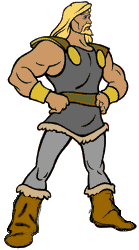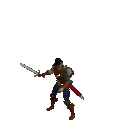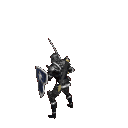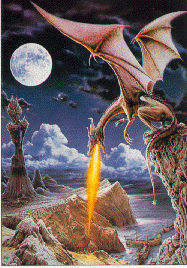





![]()
 Beowulf, the hero of the epic poem, is not an ordinary man; he is
the epitome of a true hero. With the strength of thirty men in one arm, the courage to
fight monsters, and the knowledge to respect and consider others' feelings, Beowulf
defines the word "hero." As a thane of the Geats' king Hygelac, and later as king of the Geats, Beowulf uses his courage
and wisdom to help him win many battles and competitions against humans and monsters.
Beowulf, the hero of the epic poem, is not an ordinary man; he is
the epitome of a true hero. With the strength of thirty men in one arm, the courage to
fight monsters, and the knowledge to respect and consider others' feelings, Beowulf
defines the word "hero." As a thane of the Geats' king Hygelac, and later as king of the Geats, Beowulf uses his courage
and wisdom to help him win many battles and competitions against humans and monsters.
Beowulf's list of victories consists of his swimming contest with Breca, the slaying of sea monsters, the dismembering of the monster Grendel, decapitating Grendel (or Grendel's mother), and killing the dragon. However, his greatest achievement is not killing monsters, but not letting 'hubris' destroy him. As a good warrior and king, Beowulf always keeps his pledges/promises and obeys the laws of ''comitatus.''
![]()

![]()
Wiglaf, a thane of Beowulf's tribe, is another true hero in the poem. Despite the fact that he has never fought in a battle before, Wiglaf does not hide with the cowards while his lord, Beowulf, is attacked by the dragon. Remembering all the treasures and the trust Beowulf has given his men, Wiglaf bravely helps his lord who is in need: "Beloved Beowulf, do all well, for, long since in your youth, you said that you would not let your glory while you lived. Now, great-spirited noble, brave of deeds, you must protect your life with all your might. I shall help you." (Norton, 61) By helping Beowulf, Wiglaf also obeys the laws of comitatus and is greatly rewarded by Beowulf for his loyalty and love.


Dragons are everywhere, in games, movies, and cartoons.
They are often
portrayed as evil and dangerous monsters,  who eat people and burn homes. This view of the dragon is a
direct result of the influence of Christianity and the Bible. In the Bible, the dragon is
another name for the Devil, Satan himself, the archenemy of God and Jesus. Therefore, in a
Western, Christian-based society, the dragon is viewed as an ally of the Devil and an
enemy of God. Besides being seen as evil monsters, dragons were also believed to have
treasures, such as gold or ancient artifacts in their lair. It is for one such treasure
that the battle between Beowulf and the dragon starts.
who eat people and burn homes. This view of the dragon is a
direct result of the influence of Christianity and the Bible. In the Bible, the dragon is
another name for the Devil, Satan himself, the archenemy of God and Jesus. Therefore, in a
Western, Christian-based society, the dragon is viewed as an ally of the Devil and an
enemy of God. Besides being seen as evil monsters, dragons were also believed to have
treasures, such as gold or ancient artifacts in their lair. It is for one such treasure
that the battle between Beowulf and the dragon starts.



 Beowulf, King of the Geats, who is now over
seventy years old, fights his last battle. A dragon has burned his land and his hall. With
no volunteers to stop this dragon, Beowulf himself makes a 'boast,' or a promise, to his
people that he himself will stop this evil spirit: "In my youth I engaged in many
wars. Old guardian of the people, I shall still seek battle, perform a deed of fame, if
the evil-doer will come to me out of the earth-hall" <<>(Norton, 59) Armed with his
mail-shirt, an iron shield and a sword, Beowulf challenges the dragon to a battle. With
all his experience and courage, even Beowulf is not able to defeat the dragon
single-handedly. The dragon, with its flames, seriously wounds Beowulf; it is the
"good shield [that] protected the life and body of the famous prince" (Norton,
60). With his sword having failed in its duty, Beowulf is defenseless against the
flames of the dragon. Wiglaf, seeing his beloved lord wounded and near death, courageously
goes and helps Beowulf. The two warriors manage to defeat the dragon but Beowulf is
mortally wounded. Beowulf's defeat and death are unavoidable, "...since fate did not
assign him such glory in battle" (Norton, 60). In fact, from the beginning of
the passage, Beowulf's death is foreshadowed, "Beowulf spoke, for the last time spoke
words in boast..." (Norton, 59)
Beowulf, King of the Geats, who is now over
seventy years old, fights his last battle. A dragon has burned his land and his hall. With
no volunteers to stop this dragon, Beowulf himself makes a 'boast,' or a promise, to his
people that he himself will stop this evil spirit: "In my youth I engaged in many
wars. Old guardian of the people, I shall still seek battle, perform a deed of fame, if
the evil-doer will come to me out of the earth-hall" <<>(Norton, 59) Armed with his
mail-shirt, an iron shield and a sword, Beowulf challenges the dragon to a battle. With
all his experience and courage, even Beowulf is not able to defeat the dragon
single-handedly. The dragon, with its flames, seriously wounds Beowulf; it is the
"good shield [that] protected the life and body of the famous prince" (Norton,
60). With his sword having failed in its duty, Beowulf is defenseless against the
flames of the dragon. Wiglaf, seeing his beloved lord wounded and near death, courageously
goes and helps Beowulf. The two warriors manage to defeat the dragon but Beowulf is
mortally wounded. Beowulf's defeat and death are unavoidable, "...since fate did not
assign him such glory in battle" (Norton, 60). In fact, from the beginning of
the passage, Beowulf's death is foreshadowed, "Beowulf spoke, for the last time spoke
words in boast..." (Norton, 59)
For more information concerning the following:
Click on the shields.